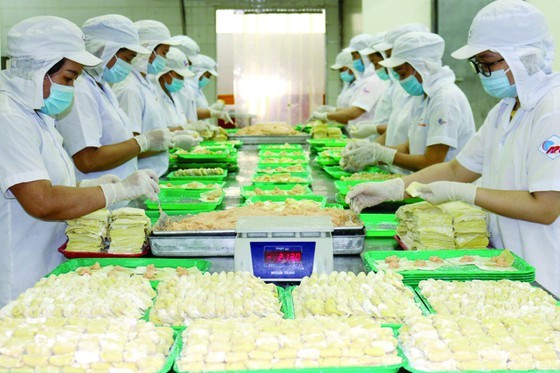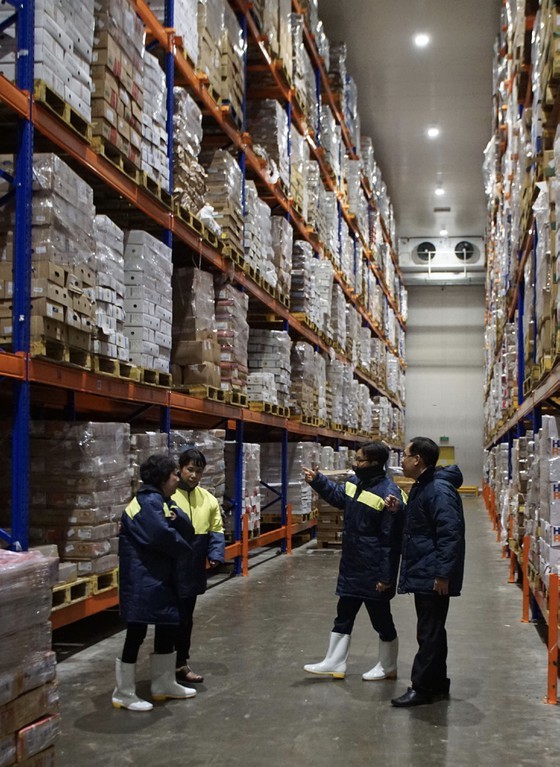 Workers of Saigon Seafood Joint Stock Company actively produce and increase the source of goods for the domestic market. (Photo: SGGP)
Workers of Saigon Seafood Joint Stock Company actively produce and increase the source of goods for the domestic market. (Photo: SGGP)
Ensuring the supply of essential goods
Ms. Ly Kim Chi, Chairwoman of FFA, said that for the group of instant noodles products, enterprises pledged that the output of instant noodles would always be abundant. Acecook Vietnam Joint Stock Company confirmed that the company's production capacity could increase by 30-50 percent.
Currently, the company produces about 3 billion packs of noodles steadily, enough to supply the market until the end of the year. It can also increase production to 4.5 billion packs of noodles if demand increases in the coming time. Although this company does not participate in the market stabilization program, it is committed to not raising its prices to share difficulties with consumers.
As for poultry meat and egg products, member enterprises also confirmed that the supply is extremely plentiful and diverse, and the selling prices continue to be stable. Specifically, Ba Huan Joint Stock Company promised to provide adequate supply and increase coverage on a large scale. In particular, food products made from poultry meat will ensure sufficient supply and keep prices steady in the next three months. As for the group of fresh pork, enterprises also confirmed to supply adequately.
Vissan Joint Stock Company said that the reserves of products, such as canned goods and pasteurized sausages, are sufficient for the supply of three months. Other processed food products can secure ample supply to the market in 15-30 days. For food products, like rice, despite high paddy prices, enterprises still maintain high inventories. Rice reserves can ensure supply until the end of the year, and the selling prices will be nailed at current levels.
It is recorded at Saigon Seafood Joint Stock Company in Binh Tan District that more than 400 workers working at six factories are still actively participating in the production. Mr. Truong Tien Dung, CEO of the company, said that separating workers into many small groups to work in many factories will prevent the risk of production disruption if there is a Covid-19 case among workers. As for the supply of essential goods, the number of orders the company received from the distribution system in the past week was higher than usual. However, compared to the capacity of the factory, this increase is not significant. With the current number of orders, it is only enough for the company to operate one shift or two shifts per day at the maximum.
The company also has 2,000 tons of food in its warehouse, including frozen foods, dried foods, fish sauce, and processed products, enough to supply the market in the next few months. On the morning of July 8 alone, the company received 2,000 more boxes of marine fish of all kinds to supply the distribution system and supermarkets. The company had prepared this plan before the Binh Dien wholesale market was temporarily closed.
Similarly, many enterprises had actively increased cold storage to store and receive seafood and marine fish. This option was prepared by companies last week, so the source of supply is currently abundant. Especially, the amount of freshwater wild and farmed fish is plentiful and always available. In case the domestic market faces a shortage of goods, enterprises will actively have plans to transfer the source of export goods to prioritize supplying domestic goods.
Striving to stabilize the selling prices
Due to the impact of the Covid-19 pandemic, the prices of domestic and imported raw materials of the food processing industry have soared sharply from the beginning of this year to now. The prices of imported seasonings and food additives surged by 5-10 percent, raw materials for plastic production jumped by 15-70 percent, and packaging climbed by 10-15 percent. Domestic raw materials, such as rice, aquatic products, and sugar, also rallied by 5-20 percent. Imported raw materials for animal feed production, such as fish meal, cereals, soybeans, additives, and oil cakes, advanced by 15-20 percent.
Ms. Ly Kim Chi, Chairwoman of FFA, said that for the group of instant noodles products, enterprises pledged that the output of instant noodles would always be abundant. Acecook Vietnam Joint Stock Company confirmed that the company's production capacity could increase by 30-50 percent.
Currently, the company produces about 3 billion packs of noodles steadily, enough to supply the market until the end of the year. It can also increase production to 4.5 billion packs of noodles if demand increases in the coming time. Although this company does not participate in the market stabilization program, it is committed to not raising its prices to share difficulties with consumers.
As for poultry meat and egg products, member enterprises also confirmed that the supply is extremely plentiful and diverse, and the selling prices continue to be stable. Specifically, Ba Huan Joint Stock Company promised to provide adequate supply and increase coverage on a large scale. In particular, food products made from poultry meat will ensure sufficient supply and keep prices steady in the next three months. As for the group of fresh pork, enterprises also confirmed to supply adequately.
Vissan Joint Stock Company said that the reserves of products, such as canned goods and pasteurized sausages, are sufficient for the supply of three months. Other processed food products can secure ample supply to the market in 15-30 days. For food products, like rice, despite high paddy prices, enterprises still maintain high inventories. Rice reserves can ensure supply until the end of the year, and the selling prices will be nailed at current levels.
It is recorded at Saigon Seafood Joint Stock Company in Binh Tan District that more than 400 workers working at six factories are still actively participating in the production. Mr. Truong Tien Dung, CEO of the company, said that separating workers into many small groups to work in many factories will prevent the risk of production disruption if there is a Covid-19 case among workers. As for the supply of essential goods, the number of orders the company received from the distribution system in the past week was higher than usual. However, compared to the capacity of the factory, this increase is not significant. With the current number of orders, it is only enough for the company to operate one shift or two shifts per day at the maximum.
The company also has 2,000 tons of food in its warehouse, including frozen foods, dried foods, fish sauce, and processed products, enough to supply the market in the next few months. On the morning of July 8 alone, the company received 2,000 more boxes of marine fish of all kinds to supply the distribution system and supermarkets. The company had prepared this plan before the Binh Dien wholesale market was temporarily closed.
Similarly, many enterprises had actively increased cold storage to store and receive seafood and marine fish. This option was prepared by companies last week, so the source of supply is currently abundant. Especially, the amount of freshwater wild and farmed fish is plentiful and always available. In case the domestic market faces a shortage of goods, enterprises will actively have plans to transfer the source of export goods to prioritize supplying domestic goods.
Striving to stabilize the selling prices
Due to the impact of the Covid-19 pandemic, the prices of domestic and imported raw materials of the food processing industry have soared sharply from the beginning of this year to now. The prices of imported seasonings and food additives surged by 5-10 percent, raw materials for plastic production jumped by 15-70 percent, and packaging climbed by 10-15 percent. Domestic raw materials, such as rice, aquatic products, and sugar, also rallied by 5-20 percent. Imported raw materials for animal feed production, such as fish meal, cereals, soybeans, additives, and oil cakes, advanced by 15-20 percent.
 Satra's cold storage is full of goods to supply to the market. (Photo: SGGP)
Satra's cold storage is full of goods to supply to the market. (Photo: SGGP)
Besides, the price of imported gasoline continues to increase, lifting domestic gasoline prices, causing additional costs to continue to inch up. All these factors have increased the production costs of the food processing industry. Currently, FFA member enterprises pledge to temporarily keep the selling prices unchanged and store goods to ensure supply for three months. However, when the reserves of raw materials run out, it will be difficult for enterprises to maintain a stable selling price. At that time, they will need the support of the State. In addition, according to Ms. Ly Kim Chi, the requirement to submit a negative test result for Covid-19 is inappropriate because testing is costly, while the validity lasts only three days, not long enough for the return trip of drivers. Moreover, as for fresh meat products, cattle and poultry are raised and slaughtered by enterprises in neighboring provinces, so they depend largely on the transportation of goods from these places to HCMC. If the stage of transport is stagnant, it will have a negative influence on the production and supply activities of food enterprises. Thereby, it will directly affect the supply of essential goods for citizens. Therefore, it is crucial and urgent to ensure the convenient transportation of raw materials between provinces to HCMC and vice versa for goods to be provided timely and sufficiently to the market demand. Food processing enterprises have focused on maintaining normal and stable production under the conditions that they have activated and met the requirements on Covid-19 prevention and control, autonomy in the sources of supply and food stockpiling, ensuring an adequate supply of essential goods for citizens. It is the basis for enterprises to create trust, peace, and stability in the community, contributing to fighting against the pandemic effectively with the city government.
























